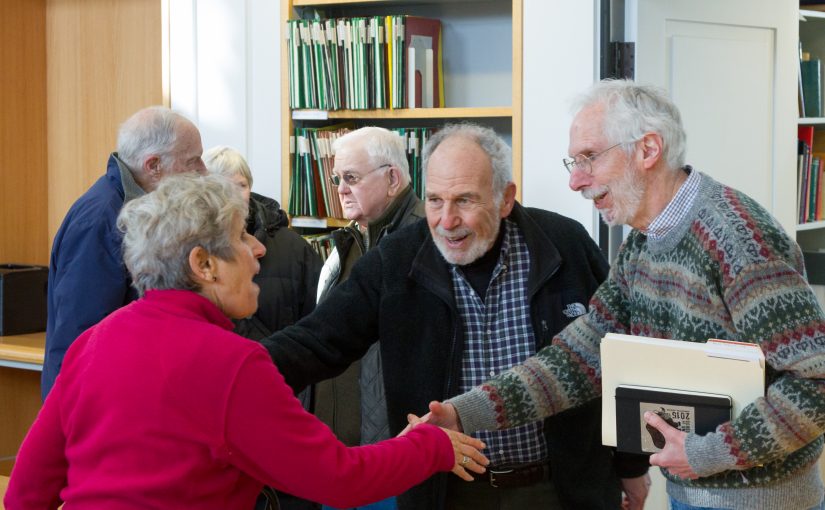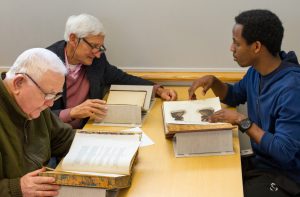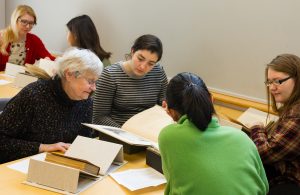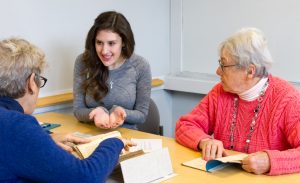Nose red and fingers frozen, I stepped out of the arctic wind and into the welcome warmth of Rauner Special Collections Library. Okay, maybe “arctic” is an exaggeration – but the 25-degree Hanover weather really helped me empathize with the men of Adolphus Greely’s 1881 polar expedition aboard the ship Proteus. Although physically thousands of miles from the earth’s coldest regions where Joanne recently completed her travels (see our previous postcards to read about her adventures in Antarctica!), first-year students and members of Dartmouth’s class of 1957 were transported that morning to a faraway, 19th century world, where brave souls explored uncharted waters while their entire countries waited, captivated to hear of their adventures and discoveries.
At the Great Issues Scholars event, Special Collections Librarians Jay Satterfield and Julia Logan guided attendees through primary source materials from two infamous arctic explorations: Greely’s previously mentioned Lady Franklin Bay Expedition, and the 1845 “lost” expedition of British naval officer Sir John Franklin. Rauner Library contains artifacts from both trips, including original maps, handwritten diaries and letters, and even a menu from a special Christmas meal aboard one of the ships! According to Ross Virginia, Professor of Environmental Studies and Director of the Institute of Arctic Studies, Rauner’s arctic collection is premiere in the world; scholars travel from far and wide to study its offerings. The Dickey Center takes this legacy of arctic scholarship one step further by offering the Stefansson Fellowship, a stipend for students to travel to the polar regions to conduct cutting-edge scientific research.
The librarians described to their spellbound audience the Greely sailors’ journey of hope then horror, telling how technical issues forced the men to spend a rough winter huddling together in a primitive shelter, awaiting rescue and resorting to cannibalism when their meager supplies ran out. One student could not hold back from interrupting the presentation to exclaim, “it’s just like a movie!”
Although not all of the attendees were particularly interested in the arctic or environmental issues, each was able to connect the story to their own international interests. Namrata Ramakrishna, a freshman planning on studying global health, was most interested in the cooperative partnership between the numerous countries that sponsored missions to the Arctic in the International Polar Year of 1882, noting that scientific research can often be very competitive. As a pre-law student, I was particularly intrigued by the crude justice system formed by Greely’s stranded men – one diary entry revealed that the men sentenced and shot one of their compatriots for stealing extra rations.
On the way to Baker Library for further discussion of the event, Great Issues Scholar Mentor Patrick Iradakunda noted how despite its rural location, Hanover is incredibly connected to the world. Bruce Bernstein, Dartmouth Class of 1957, felt the same way during his time at Dartmouth. Bernstein noted how college President John Sloan Dickey’s mandatory Great Issues course forced senior students to think about the world beyond the “Hanover bubble.” Rauner’s arctic collection is the perfect embodiment of this paradox: although braving the Hanover cold is the closest most students will get to the polar regions in their lifetimes, any of them can make the short trek from their dorm rooms to Rauner to experience the collection firsthand.
As campus correspondent (that’s me with hands cupped in the picture above), you can expect to hear from me on a few occasions, as I tie the work that Dartmouth students like Joanne are doing abroad with happenings on campus. Stay tuned for the next postcard, which features a junior and his work with refugees.
Until next time,
Freya




